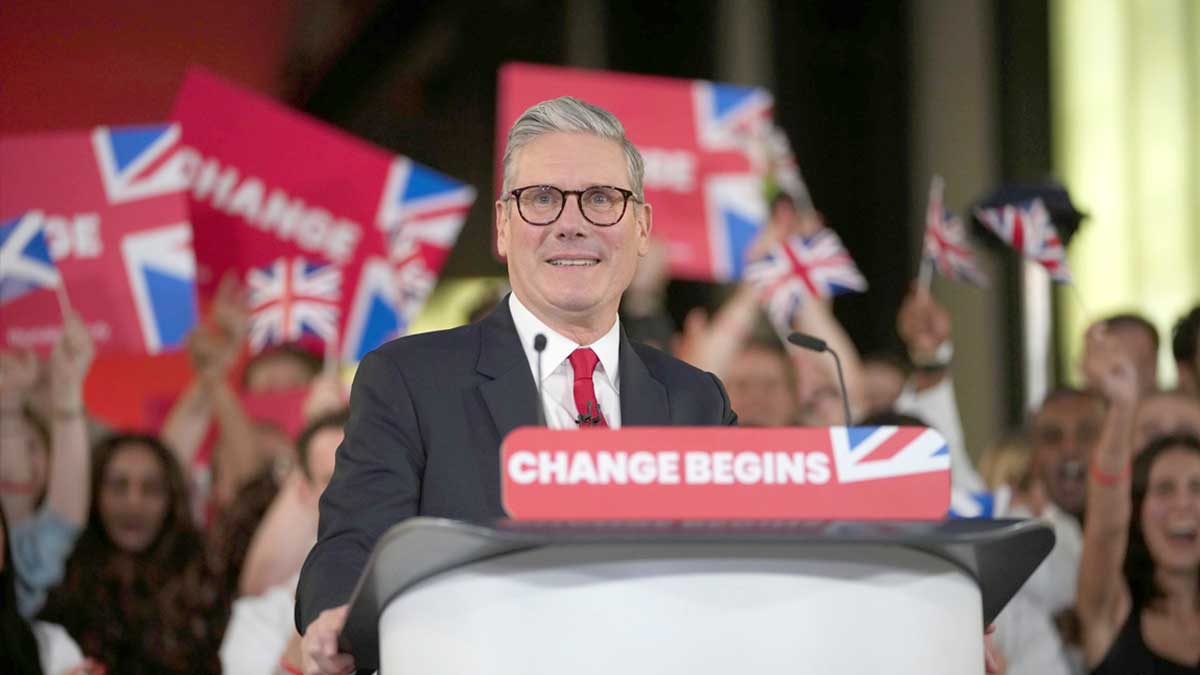- Home
- Billionaires
- Investing Newsletters
- 193CC 1000
- Article Layout 2
- Article Layout 3
- Article Layout 4
- Article Layout 5
- Article Layout 6
- Article Layout 7
- Article Layout 8
- Article Layout 9
- Article Layout 10
- Article Layout 11
- Article Layout 12
- Article Layout 13
- Article Layout 14
- Article Sidebar
- Post Format
- pages
- Archive Layouts
- Post Gallery
- Post Video Background
- Post Review
- Sponsored Post
- Leadership
- Business
- Money
- Small Business
- Innovation
- Shop
Recent Posts
Labour Party Secures Historic Landslide Victory in U.K. Election

In a historic development early Friday, the Labour Party achieved a commanding victory in the U.K.’s general election, positioning itself to secure a supermajority in the British Parliament. This result represents a major shift in the country’s political landscape, marking the end of 14 years of Conservative governance under Prime Minister Rishi Sunak and his predecessors. The outcome is being viewed as a pivotal moment that could herald a new era in British politics, characterized by significant policy changes and a reorientation of national priorities.
As vote counting progresses, the BBC’s real-time tracker reveals that Labour has already surpassed the 326 seats required for a majority in the House of Commons. Early exit polls are even more promising, suggesting that Labour could secure as many as 410 seats, a substantial increase from their previous count. This level of support underscores a dramatic departure from the status quo and reflects widespread public dissatisfaction with the Conservative government’s handling of key issues over the past decade.
In the aftermath of Labour’s decisive win, party leader Keir Starmer, who is set to become the next Prime Minister, addressed an enthusiastic crowd of supporters. Starmer’s victory speech was both a rallying cry and a promise of substantial change. He stated, “Change begins now,” signaling his commitment to addressing the needs of working-class citizens and reforming the country’s approach to key issues. His speech highlighted Labour’s focus on economic and social policies aimed at revitalizing public services and addressing inequality.
Just prior to Starmer’s address, outgoing Prime Minister Rishi Sunak made his concession speech. Sunak described the election results as a “sobering verdict” and acknowledged that it was a “difficult night” for the Conservative Party. His comments reflected the gravity of the party’s poor performance and the substantial shift in voter sentiment away from the Conservatives. Sunak’s resignation marks the end of an era for the party, which has faced increasing criticism and declining support in recent years.
The Conservative Party, often referred to as the Tories, is projected to secure only 131 out of the 650 seats in the House of Commons, marking their worst electoral performance in history. This dramatic decline is partly attributed to the rise of the Reform U.K. party, led by Nigel Farage. Reform U.K., which positioned itself to the right of the Conservative Party, attracted a significant portion of the Tory vote. Exit polls suggest that Reform U.K. may secure up to 13 seats, underscoring its influence in the election and its role in eroding Conservative support.
In a notable turn of events, the Liberal Democrat party, which had suffered heavy losses in the 2019 elections, made a remarkable comeback. The party has won over 70 seats, propelling it to the position of the third-largest party in Parliament. This resurgence reflects a shift in voter preferences and a growing appetite for centrist and moderate policies in British politics.
Keir Starmer’s victory speech encapsulated the transformative nature of Labour’s win. He articulated a vision of national renewal, stating, “Across our country, people will be waking up to the news that a weight has been lifted, a burden finally removed from the shoulders of this nation…a mandate like this comes with a great responsibility…Today we start the next chapter…begin the work of change, the mission of national renewal, and start to rebuild our country.” Starmer’s words reflect the high expectations placed upon his leadership and the broad mandate for change that Labour has received.
The election also saw the defeat of several prominent Conservative figures. Former Prime Minister Liz Truss, whose tenure was notably brief and tumultuous, lost her seat along with other high-profile Conservative candidates. Penny Mordaunt, the Leader of the House of Commons and a potential successor to Sunak, was defeated by a Labour candidate. Other significant losses for the Conservatives included former cabinet ministers such as Jacob Rees-Mogg, Defense Secretary Grant Shapps, and Education Secretary Gillian Keegan. These defeats signal a significant reshuffling within the Conservative Party and highlight the scale of Labour’s victory.
Labour secured 34.2% of the popular vote, reflecting a modest increase of 1.4% from their 2019 performance, when they won 202 seats. In contrast, the Conservative Party’s vote share fell sharply from 43.6% in 2019 to 23.5%. The rise of Reform U.K., which captured 14.3% of the vote, played a crucial role in diminishing Conservative support and reshaping the election results.
In the U.K., the transition between administrations is notably swift compared to the U.S. presidential process. Prime Minister Rishi Sunak is expected to promptly meet with King Charles III to submit his resignation. Following this, the British monarch will officially invite Keir Starmer to Buckingham Palace to form the new government. This rapid transition ensures that the new leadership can quickly begin implementing its agenda, setting the stage for Labour’s forthcoming policy initiatives.
This historic election not only redefines the British political landscape but also sets the stage for a substantial shift in governance and policy direction. The implications of Labour’s victory will be closely watched as the new government embarks on its ambitious agenda for change and reform.
Recent Posts
Categories
- 193cc Digital Assets2
- 5G1
- Aerospace & Defense46
- AI37
- Arts3
- Banking & Insurance11
- Big Data3
- Billionaires449
- Boats & Planes1
- Business328
- Careers13
- Cars & Bikes76
- CEO Network1
- CFO Network17
- CHRO Network1
- CIO Network1
- Cloud10
- CMO Network18
- Commercial Real Estate7
- Consultant1
- Consumer Tech180
- CxO1
- Cybersecurity68
- Dining1
- Diversity, Equity & Inclusion4
- Education7
- Energy8
- Enterprise Tech29
- Events11
- Fintech1
- Food & Drink2
- Franchises1
- Freelance1
- Future Of Work2
- Games141
- GIG1
- Healthcare78
- Hollywood & Entertainment186
- Houses1
- Innovation42
- Investing2
- Investing Newsletters4
- Leadership65
- Lifestyle11
- Manufacturing1
- Markets20
- Media193
- Mobile phone1
- Money13
- Personal Finance2
- Policy567
- Real Estate1
- Research6
- Retail1
- Retirement1
- Small Business1
- SportsMoney33
- Style & Beauty1
- Success Income1
- Taxes2
- Travel10
- Uncategorized8
- Vices1
- Watches & Jewelry2
- world's billionaires418
Related Articles
Trump Moves $4B Stake in Truth Social Parent, Stock Drops 6%
Donald Trump recently transferred his 57% stake in Trump Media & Technology...
By 193cc Agency CouncilDecember 20, 2024House Rejects Trump-Backed Funding Bill, Shutdown Looms
The U.S. House of Representatives rejected a new government funding bill on...
By 193cc Agency CouncilDecember 20, 2024Trump Named Time’s Person of the Year for Second Time
On Thursday, Time magazine honored Donald Trump as its “Person of the...
By 193cc Agency CouncilDecember 12, 2024Meta Donates $1 Million to Trump’s Inaugural Fund
Meta, the parent company of Facebook and Instagram, has confirmed a $1...
By 193cc Agency CouncilDecember 12, 2024















Leave a comment